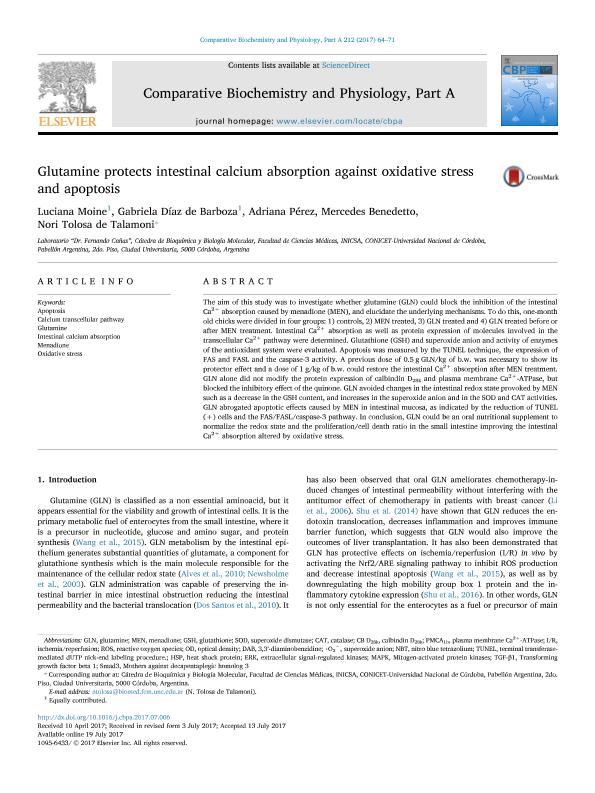Mostrar el registro sencillo del ítem
dc.contributor.author
Moine, Luciana Beatriz

dc.contributor.author
Díaz de Barboza, Gabriela Edith

dc.contributor.author
Pérez, Adriana del Carmen

dc.contributor.author
Benedetto, Maria Mercedes

dc.contributor.author
Tolosa, Nori Graciela

dc.date.available
2018-11-14T18:36:39Z
dc.date.issued
2017-10
dc.identifier.citation
Moine, Luciana Beatriz; Díaz de Barboza, Gabriela Edith; Pérez, Adriana del Carmen; Benedetto, Maria Mercedes; Tolosa, Nori Graciela; Glutamine protects intestinal calcium absorption against oxidative stress and apoptosis; Elsevier Science Inc; Comparative Biochemistry and Physiology Part A: Molecular and Integrative Physiology; 212; 10-2017; 64-71
dc.identifier.issn
1095-6433
dc.identifier.uri
http://hdl.handle.net/11336/64498
dc.description.abstract
The aim of this study was to investigate whether glutamine (GLN) could block the inhibition of the intestinal Ca2+ absorption caused by menadione (MEN), and elucidate the underlying mechanisms. To do this, one-month old chicks were divided in four groups: 1) controls, 2) MEN treated, 3) GLN treated and 4) GLN treated before or after MEN treatment. Intestinal Ca2+ absorption as well as protein expression of molecules involved in the transcellular Ca2+ pathway were determined. Glutathione (GSH) and superoxide anion and activity of enzymes of the antioxidant system were evaluated. Apoptosis was measured by the TUNEL technique, the expression of FAS and FASL and the caspase-3 activity. A previous dose of 0.5 g GLN/kg of b.w. was necessary to show its protector effect and a dose of 1 g/kg of b.w. could restore the intestinal Ca2+ absorption after MEN treatment. GLN alone did not modify the protein expression of calbindin D28k and plasma membrane Ca2+-ATPase, but blocked the inhibitory effect of the quinone. GLN avoided changes in the intestinal redox state provoked by MEN such as a decrease in the GSH content, and increases in the superoxide anion and in the SOD and CAT activities. GLN abrogated apoptotic effects caused by MEN in intestinal mucosa, as indicated by the reduction of TUNEL (+) cells and the FAS/FASL/caspase-3 pathway. In conclusion, GLN could be an oral nutritional supplement to normalize the redox state and the proliferation/cell death ratio in the small intestine improving the intestinal Ca2+ absorption altered by oxidative stress.
dc.format
application/pdf
dc.language.iso
eng
dc.publisher
Elsevier Science Inc

dc.rights
info:eu-repo/semantics/openAccess
dc.rights.uri
https://creativecommons.org/licenses/by-nc-sa/2.5/ar/
dc.subject
Apoptosis
dc.subject
Calcium Transcellular Pathway
dc.subject
Glutamine
dc.subject
Intestinal Calcium Absorption
dc.subject
Menadione
dc.subject
Oxidative Stress
dc.subject.classification
Otras Ciencias Biológicas

dc.subject.classification
Ciencias Biológicas

dc.subject.classification
CIENCIAS NATURALES Y EXACTAS

dc.title
Glutamine protects intestinal calcium absorption against oxidative stress and apoptosis
dc.type
info:eu-repo/semantics/article
dc.type
info:ar-repo/semantics/artículo
dc.type
info:eu-repo/semantics/publishedVersion
dc.date.updated
2018-10-22T16:47:50Z
dc.identifier.eissn
1531-4332
dc.journal.volume
212
dc.journal.pagination
64-71
dc.journal.pais
Estados Unidos

dc.description.fil
Fil: Moine, Luciana Beatriz. Consejo Nacional de Investigaciones Científicas y Técnicas. Centro Científico Tecnológico Conicet - Córdoba. Instituto de Investigaciones en Ciencias de la Salud. Universidad Nacional de Córdoba. Instituto de Investigaciones en Ciencias de la Salud; Argentina
dc.description.fil
Fil: Díaz de Barboza, Gabriela Edith. Universidad Nacional de Córdoba. Facultad de Medicina. Cátedra de Bioquímica y Biología Molecular; Argentina. Consejo Nacional de Investigaciones Científicas y Técnicas. Centro Científico Tecnológico Conicet - Córdoba. Instituto de Investigaciones en Ciencias de la Salud. Universidad Nacional de Córdoba. Instituto de Investigaciones en Ciencias de la Salud; Argentina
dc.description.fil
Fil: Pérez, Adriana del Carmen. Universidad Nacional de Córdoba. Facultad de Medicina. Cátedra de Bioquímica y Biología Molecular; Argentina. Consejo Nacional de Investigaciones Científicas y Técnicas. Centro Científico Tecnológico Conicet - Córdoba. Instituto de Investigaciones en Ciencias de la Salud. Universidad Nacional de Córdoba. Instituto de Investigaciones en Ciencias de la Salud; Argentina
dc.description.fil
Fil: Benedetto, Maria Mercedes. Consejo Nacional de Investigaciones Científicas y Técnicas. Centro Científico Tecnológico Conicet - Córdoba. Centro de Investigaciones en Química Biológica de Córdoba. Universidad Nacional de Córdoba. Facultad de Ciencias Químicas. Centro de Investigaciones en Química Biológica de Córdoba; Argentina
dc.description.fil
Fil: Tolosa, Nori Graciela. Consejo Nacional de Investigaciones Científicas y Técnicas. Centro Científico Tecnológico Conicet - Córdoba. Instituto de Investigaciones en Ciencias de la Salud. Universidad Nacional de Córdoba. Instituto de Investigaciones en Ciencias de la Salud; Argentina
dc.journal.title
Comparative Biochemistry and Physiology Part A: Molecular and Integrative Physiology

dc.relation.alternativeid
info:eu-repo/semantics/altIdentifier/url/http://linkinghub.elsevier.com/retrieve/pii/S1095643317301630
dc.relation.alternativeid
info:eu-repo/semantics/altIdentifier/doi/http://dx.doi.org/10.1016/j.cbpa.2017.07.006
dc.relation.alternativeid
info:eu-repo/semantics/altIdentifier/url/www.ncbi.nlm.nih.gov/pubmed/28732794
Archivos asociados
